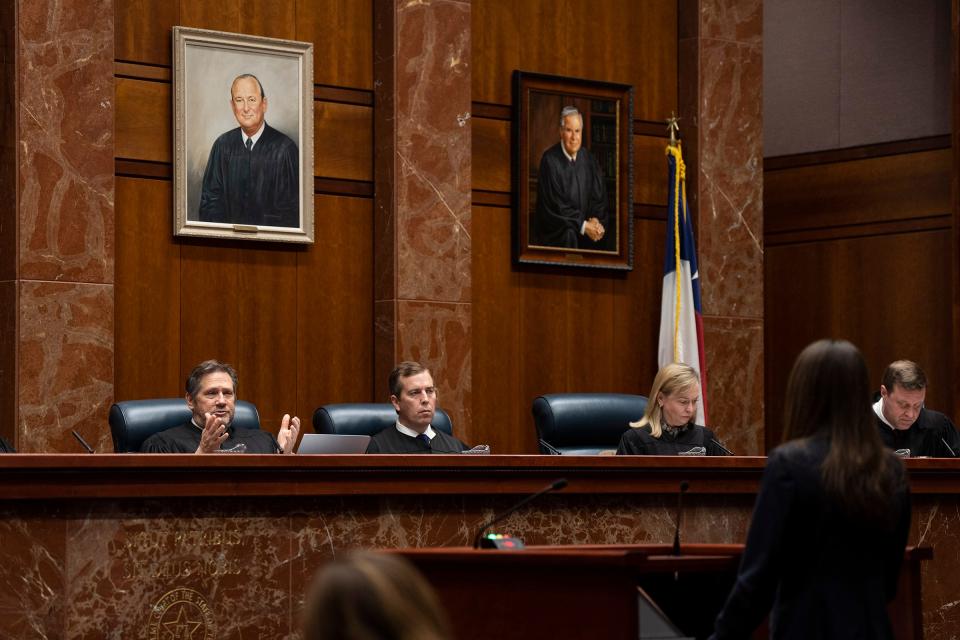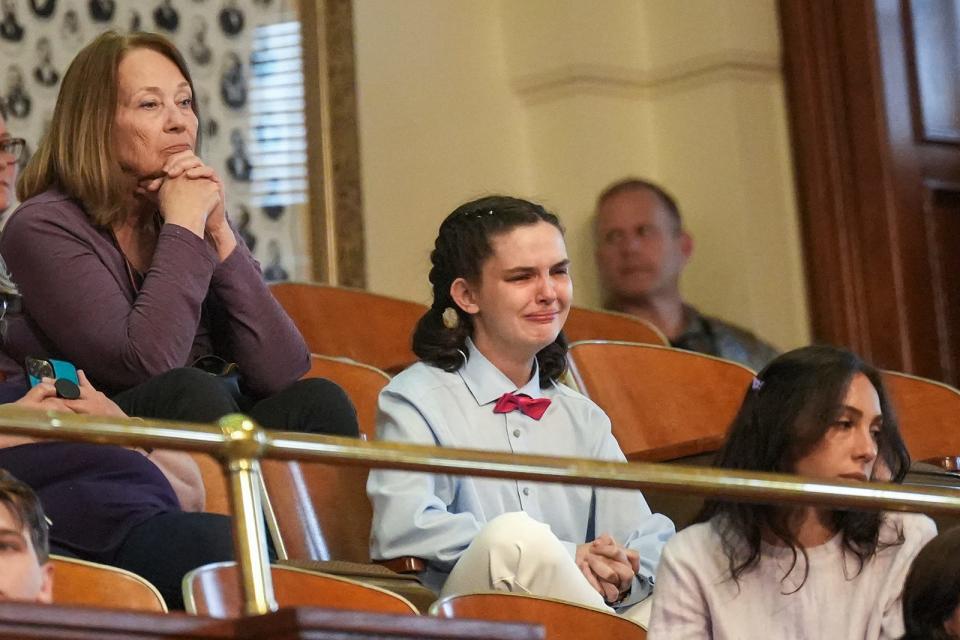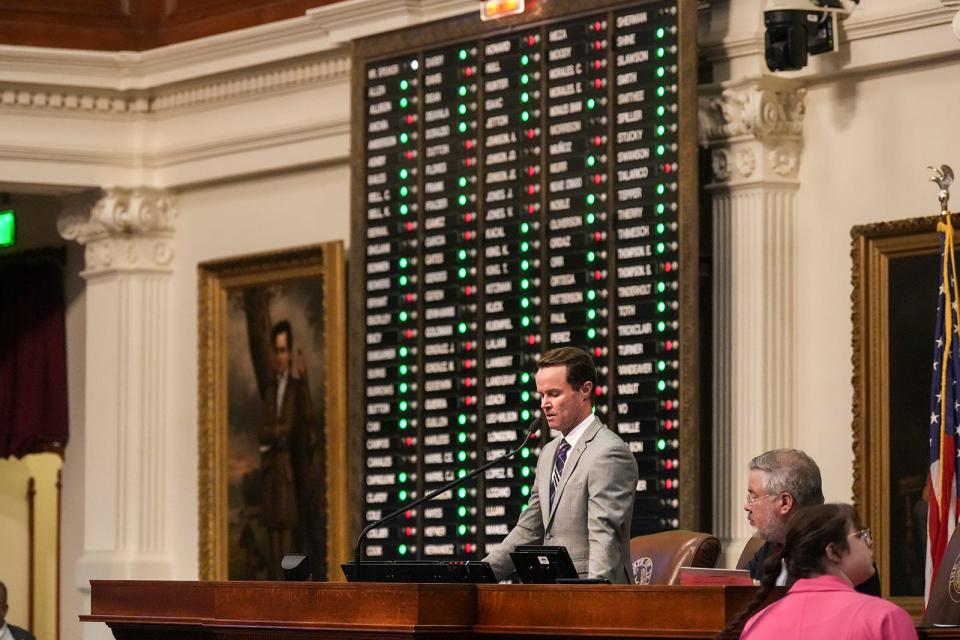Texas district judge blocks Ken Paxton's demands for PFLAG gender-affirming care records
- Oops!Something went wrong.Please try again later.
A Travis County state District Court on Monday blocked Texas Attorney General Ken Paxton from demanding information from a nationwide LGBTQ+ organization about its support for families seeking gender-affirming medical care for transgender youths, finding that there is "a substantial likelihood" that the nonprofit's case against the state "will prevail after a trial on the merits."
The LGBTQ+ organization, PFLAG National, sued the attorney general's office Feb. 29 after receiving what it called an "outrageous and unconstitutional demand" for records. The civil investigative demand that Paxton sent to PFLAG seeks information about alleged "misrepresentations regarding Gender Transitioning and Reassignment Treatments" as well as relating to the nonprofit's statements in Loe v. Texas and PFLAG v. Abbott, two cases in which the group is suing the state on behalf of families that have sought or provided gender-affirming care to their children.
In Loe v. Texas, the Texas Supreme Court in January heard oral arguments on whether parents in the state have the right to let their children receive gender-affirming medical care after the Legislature last year passed Senate Bill 14, a law that went into effect in September and prohibits doctors in Texas from providing certain gender-affirming medical treatments — including puberty blockers, hormone therapy and certain surgeries — to minors experiencing gender dysphoria, a condition in which a person’s gender identity doesn’t match their sex at birth.
After a Monday morning hearing, District Court Judge Amy Clark Meachum, a Democrat, issued the temporary injunction against Paxton's "unlawful" demands for information and documents, writing that the attorney general's office exceeded its authority.
The injunction replaces a temporary restraining order that Judge Maria Cantú Hexsel of the 53rd District Court issued March 1, which would have expired Friday, and will remain active until the case is resolved. A trial is set for 9 a.m. June 10.

In addition to allowing PFLAG to keep its information private, the judge's order bars Paxton from retaliating against the organization.
“PFLAG National has consistently protected Texas families with transgender youth in the face of the State’s persecution,” Chloe Kempf, an attorney for the ACLU of Texas, said in a statement. “This court ruling is a critical step in allowing PFLAG National and its members to join together and advocate for each other, free from the threat of the attorney general’s retaliation and intimidation."

In its original petition, lawyers for the group wrote that it appeared Paxton's office was "seeking to determine which Texas families are seeking to access gender-affirming care for their transgender adolescents" in multiple civil investigative demands, which could reveal the families' identities.
In Monday's injunction order as in the March 1 temporary restraining order, the court wrote that the requests for information and documents are "unlawful" and that PFLAG and its members — the parents and families of transgender youths — would suffer "immediate and irreparable injury" if the attorney general were allowed to obtain information ahead of a trial.
The order states that Paxton's office's requests would have inhibited families' exercise of free speech and harmed their ability to "avail themselves of the courts when their constitutional rights are threatened." The order also says the demands would have led to "gross invasions of both PFLAG's and its members' privacy in an attempt to bypass discovery stays entered in both Loe v. Texas and PFLAG v. Abbott."
Paxton's office did not respond to an American-Statesman request for comment Monday.
In a statement Feb. 29 about the lawsuit, Paxton said he is going after PFLAG for hiding what he called "incriminating documents" that he thinks will answer the question of whether "medical providers are committing insurance fraud in order to circumvent" SB 14.
“Texas passed SB 14 to protect children from damaging, unproven medical interventions with catastrophic lifelong consequences for their health,” Paxton said in the statement. “Any organization seeking to violate this law, commit fraud, or weaponize science and medicine against children will be held accountable.”
More: Is Texas' ban on gender-affirming care for minors constitutional? Supreme Court hears case

The state has argued that gender-affirming care treatments are ineffective and potentially dangerous in the long term for minors, largely tossing aside discrimination concerns and the effects on parents' rights to seek medical treatment for their children.
Major medical associations, including the American Academy of Pediatrics, the American Medical Association, and the American Psychiatric Association, support the provision of developmentally-appropriate and individualized gender-affirming medical care for transgender youth, saying it can be lifesaving and medically necessary.
Paxton's requests to PFLAG also come after several efforts by the attorney general's office to obtain medical records of Texas residents who might have received gender-affirming care at out-of-state hospitals in Seattle and Georgia. Seattle Children's Hospital sued the attorney general's office over Paxton's requests in December.
In requesting records dating back to 2022, Paxton's office cites a state provision that forbids companies from making "misrepresentations regarding Gender Transitioning Treatments and Procedures and Texas law" in advertisements sent to Texas residents.
Several motions in PFLAG's case against the attorney general are still pending, including a motion from Paxton that the court "modify and clarify" the initial restraining order and another plea that the office filed Friday.
In a statement Monday afternoon, Brian K. Bond, CEO of PFLAG National, celebrated the court's decision.
“PFLAG families in Texas gained further protection today when the court reaffirmed that the Attorney General can’t two-step around the law,” Bond wrote. “PFLAG National will continue to fight to protect our families, because trans youth and their loved ones deserve better, and loving your LGBTQ+ kid is always the right thing to do.”
Statesman staff writer Hogan Gore contributed to this report.
This article originally appeared on Austin American-Statesman: Texas judge blocks AG's demands for youth gender-affirming care records

